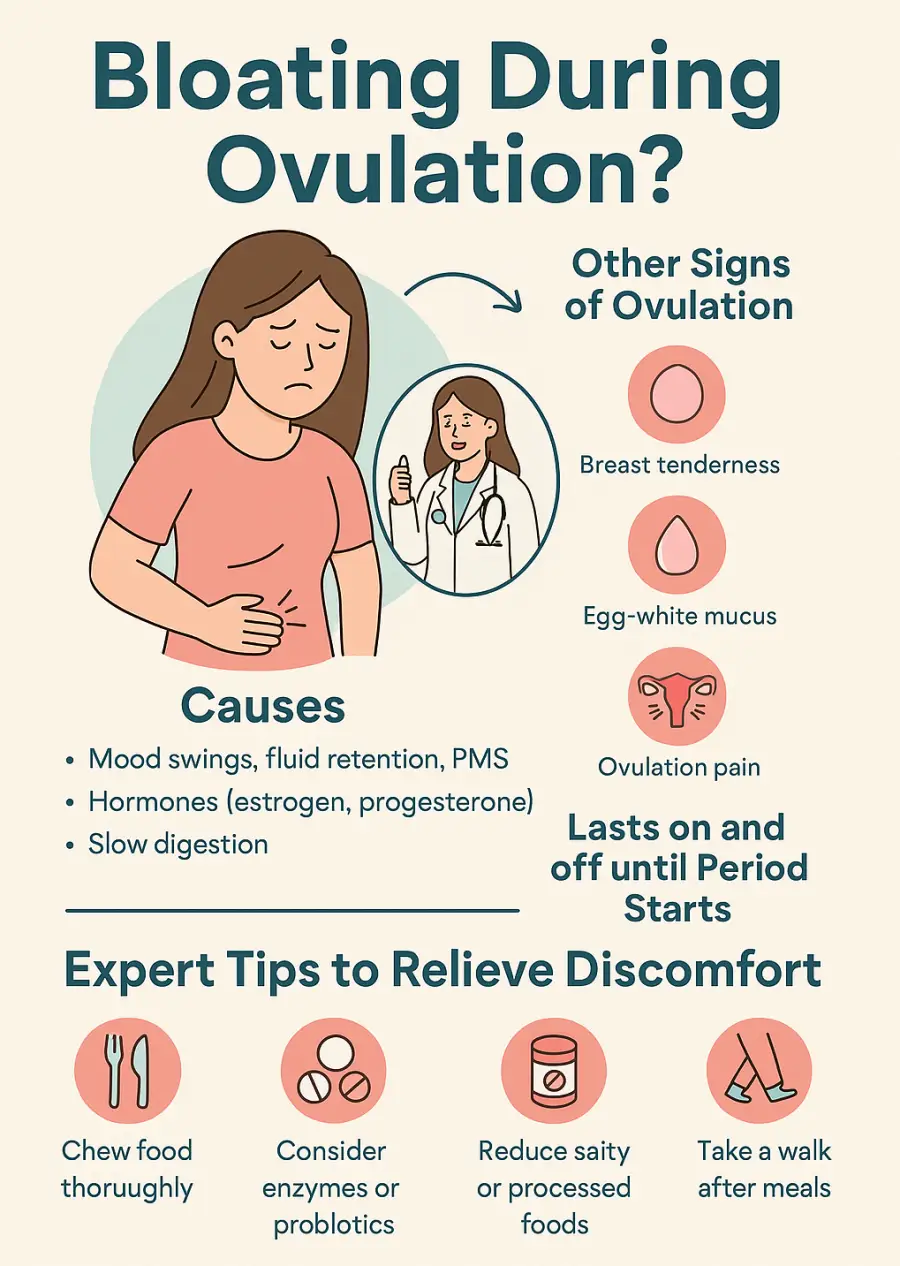What exactly is “bloating”?
Clinically, bloating is a feeling of fullness, tightness, or abdominal pressure even if your waist size hasn’t actually increased. It’s driven by changes in gut motility, gas production, and fluid balance—and it’s very common, especially in people with sensitive digestion.
Is bloating a sign of ovulation?
It can be—just not the most reliable one. Ovulation itself is short (about 16–32 hours). Immediately after, you enter the luteal phase, when progesterone rises and gut transit naturally slows. That slowdown can trap gas and contribute to bloating.
Other (often better) ovulation clues
- Breast tenderness
- Egg-white or slippery cervical mucus
- Slight rise in basal body temperature
- Ovulation pain (Mittelschmerz): one-sided twinges or cramps in the lower abdomen; about 40% of women report this, lasting minutes to 48 hours.
For precision, use an ovulation test kit to time your fertile window.
Which hormones cause bloating during ovulation?
At ovulation, estrogen and luteinizing hormone (LH) peak. Soon after, progesterone rises and can slow digestion. The result: more gas retention and that tight, “balloon” feeling.
Other reasons you may feel bloated mid-cycle
The luteal phase overlaps with premenstrual syndrome (PMS), which can bring mood changes, cravings, fluid retention, and bloating. Underlying factors like IBS, constipation, high-FODMAP foods, lactose intolerance, or simply eating quickly can amplify symptoms.
How long does ovulation bloating last?
Although ovulation is brief, the luteal phase lasts up to two weeks. You may notice on-and-off bloating during this time, especially closer to your period.
Ovulation vs. pregnancy bloating
- Ovulation/luteal bloating: driven by hormonal shifts preparing for a potential pregnancy; tends to ebb and flow until your period starts.
- Pregnancy bloating: early progesterone surge slows the GI tract; later, your growing uterus adds pressure. Better early signs include a missed period or morning sickness.
Do you bloat during ovulation? (Short answer)
Yes, many do. If it’s mild and not disrupting life, it’s usually normal. If it’s severe, persistent, or associated with red-flag symptoms (fever, vomiting, severe pain), speak with your clinician.
Evidence-informed ways to reduce bloating during and after ovulation
Smart eating habits that actually help digestion
- Engage the “cephalic phase”: Pause before eating. Look at and think about your meal to prime enzymes and stomach acid.
- Chew thoroughly: Your stomach has no teeth. Proper chewing reduces fermentation and gas downstream.
- Support healthy stomach acid: If you experience “heavy” digestion, a teaspoon of apple cider vinegar with the mother in water before main meals may help. If burning worsens, stop; occasional antacids (or a small pinch of bicarbonate in water) can neutralize excess acid—avoid frequent use and high-sodium products if you have blood-pressure concerns.
- Try digestive enzymes: Pineapple or papaya before meals provide natural enzymes; quality enzyme supplements are another option if meals tend to sit heavily.
Nutrition & hydration
- Go easy on salt to reduce water retention and breast tenderness.
- Focus on whole foods; limit ultra-processed “PMS cravings” most days.
- Identify triggers: If bloating is frequent, discuss testing for lactose intolerance or a FODMAP sensitivity with your clinician or dietitian.
- Hydrate consistently to support motility.
Gut support
- Probiotics/prebiotics: Support a balanced microbiome; look for daily multi-strain formulas and give them several weeks.
- Magnesium: 200–400 mg/day (diet + supplements) may ease PMS-related bloating and promote regularity. Check with your clinician if you have kidney issues or take medications.
Move & de-stress
- Post-meal walk: A gentle 10–15-minute stroll after eating can lower post-meal glucose and speed gastric emptying (hello, less gas).
- Regular exercise: Aerobic activity over 6–8 weeks is linked to reduced PMS symptoms, including bloating.
- Manage stress: The brain–gut axis is real. Mindfulness, breathwork, and adequate sleep can calm the gut.
When to seek medical advice
Get evaluated if bloating is severe, persistent, or paired with fever, vomiting, blood in stool, dramatic cycle changes, or pain that doesn’t improve. Consider PMDD if symptoms are debilitating each luteal phase.
Key takeaways
- Bloating during ovulation is common—hormones slow gut transit during the luteal phase.
- Simple digestion habits (prime, chew, support acid, enzymes) + post-meal walks help fast.
- Nutrition, probiotics, magnesium, stress care, and steady exercise reduce recurrences.
- Use ovulation tests for accurate timing; don’t rely on bloating alone.
FAQs
Do you bloat during ovulation?
Many people do. Hormonal shifts around ovulation and into the luteal phase slow digestion, making bloating more likely.
What helps quickly when I’m already bloated?
Try a slow 10–15-minute walk, peppermint tea, gentle abdominal breathing, and a warm compress. Chew well at the next meal and avoid very salty, carbonated, or ultra-processed foods for the day.
Could my bloating be from pregnancy instead?
Early pregnancy can also cause bloating, but stronger clues are a missed period and morning nausea. Take a pregnancy test if your period is late.
Medical disclaimer: This article is for educational purposes and is not a substitute for personalized medical advice.

